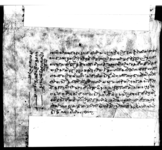A loan deed wherein Padma Jaṅg Sāha pledges a servant as security to Ḍaṃbara Kumārī Devī (VS 1956)
ID: K_0210_0064
Edited and
translated by Manik Bajracharya
in collaboration with
Yogesh Budathoki and Raju Rimal
Created: ;
Last modified: 2019-03-30
For the metadata of the document, click here
The accompanying edition, translation/synopsis and/or commentary are available under the terms of the Creative Commons Attribution-ShareAlike 4.0 International License
Abstract
This is a deed, secured by the pledge of a nine-year-old servant girl, formalizing Padma Jaṅg Sāha's borrowing of 46½ rupees from Ḍaṃbara Kumārī Devī. the transfer of a slave girl, aged 9, by Padma Jaṅg Sāha to for borrowing rupees 46 1/2 from the creditor.Diplomatic edition
[1r]
1साछी2हरीसीधीवस्नेइन्द्रवीरकार्कि¯¯¯¯¯¯¯¯¯१
3पाटनवैलछेवस्न्यासाहुलाल¯¯¯¯¯¯¯¯¯१
4लेषतप्रतिसोहस्त¯¯¯¯¯¯¯¯¯१1स्वस्तिश्रीसम्वत१९५६सालमीति•फागुणवदि९रोज६तद्दिनेलिषीतमधनी
2कनाम•डम्वरकुमारि•देवीसुव्वेनीव्राह्मणी•असामीधनवेहोरिणीकनाम
3पाल्पातान्सेंघरहुनेवाग्मतिपुलनेरावस्न्याचौतरीयापद्मजंसाहलिहल
4चादीकामोहरू•४६॥•अक्षेरूपीसाडेछयालीसकर्जालीञावावत्५५सा
5लकासवारिषर्चगर्नानीमीत्तलीयाकोहुंसोसाल्मात्मसुकनलेषीरूपैआ
6लीयाकोहुनालेसोरूपैञालीयाकासालदेषी•नफा•कवोल्स
7येकडा•दसौदीकादर्लेज्येस्ठमैन्हाभरमाबुझाउलासोभाषामाबुझाउन
8सकीनभने •मसीतनभयाकोहुनाले•मेराघर्कारामवदनभंनेसुसारे
9वर्ष९कोपंचकिर्तिगरीलीनु•भनिमेरामनोमानषुसीराजीसंगत्मसुक्
10लेषी•मजकुरसाहुलाइदीञायेसबेहोराकोसाछिफट्केमालेषीया
11कोछसम्वतमीतिसदरशुभ्म्¯¯¯ ¯¯¯ ¯¯¯ ¯¯¯ ¯¯¯ ¯¯¯ ¯¯¯
Translation
[1r]
Witnesses:
Indravīra Kārki, resident of Harīsīdhī1 - 1
Sāhu Lāla, resident of Vailache2 , Patan - 1
lekhata prati sohasta3 - 1
Hail! Written on Friday, the 9th of the dark fortnight of Phāguna in the [Vikrama] era year 1956 (1900 CE). I, the debtor named CautarīyāPadma Jaṃ Sāha, whose house [originally] is in Tānsen, Pālpā and [who currently] resides near the Vāgmatī bridge, have received a loan of 46½ current silver mohararupaiyās, in words forty-six and a half, from the creditor named Ḍambara Kumārī Devī, the Brahmin subbenī4 . I took [the loan] for covering the cost of a trip (savārī) in the year [19]55.5 I took the loan in that year without drawing up a loan agreement (tamasuka). I will pay [the amount, together with] the agreed interest of ten percent starting from the year I took the loan, by the month of Jyeṣṭha. If I cannot repay [the amount] by the promised [date] on account of not having [the money], my 9-year-old house servant (susāre) named Rāmavadana shall be taken after [her price] is determined by the five village notables (paṃcakīrti garī). I have written this agreement willingly, and have handed it over to the aforementioned (majakura) creditor.
The witnesses to this deed are written in the margin. The date is valid. Auspiciousness.
Commentary
This loan agreement between the debtor Padma Jaṅg Sāha and the creditor Ḍambara Kumārī Devī takes a standard form. The debtor is originally from Palpa, but currently a resident near Vāgmatī bridge. The creditor's place of residence is not mentioned. One can, however, assume that she is from Patan as both the witnesses to the deed are from Patan and that the deed was likely drawn up in the city. It is stipulated that the debtor's household servant Rāmavadan is to be surrendered to the creditor upon failure to repay the loan amount. The deed doesn't expressly call her a pledge, and this would mean that she was assigned as a non-usufructuary pledge.

